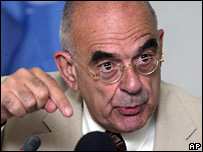
The Sudanese military has led calls for Mr Pronk's removal
|
The head of the UN mission in Sudan, Jan Pronk, has left the country after being expelled by Sudan's government. Mr Pronk, who already had shaky ties with Khartoum, wrote in his blog that Sudan's army had suffered defeats in Darfur and its morale was low.
Sudan is resisting strong international pressure to admit UN peacekeepers to try to end the conflict in Darfur.
The expulsion was attacked by former rebels from south Sudan, who joined the national government last year.
The BBC's correspondent in Khartoum, Jonah Fisher, says Mr Pronk's departure from the capital was a low-key affair.
The government, he says, has made it clear they do not want him to return.
 |
HAVE YOUR SAY
 One of the main reasons the Sudanese government will not accept UN peacekeepers is that they believe the UN has chosen sides in the dispute One of the main reasons the Sudanese government will not accept UN peacekeepers is that they believe the UN has chosen sides in the dispute 
David Zimlin, Florida, US
|
UN Secretary-General Kofi Annan, however, says he still has complete confidence in Mr Pronk.
"His status remained unchanged," said Mr Annan's spokesman.
Earlier on Monday, US Secretary of State Condoleezza Rice criticised the order for Mr Pronk to leave, labelling it "unfortunate in the extreme".
Ms Rice said she would consult Mr Annan over the decision.
The UK condemned Mr Pronk's expulsion and urged Sudan to reconsider.
'Creating problems'
Sudan's government had given Mr Pronk until midday Wednesday to leave.
 |
JAN PRONK
1940 - Born in The Hague, Netherlands
1971 - Elected as Dutch MP
1985 -1986 Assistant UN secretary general
1998 - Dutch environment minister
2001 - Chairman of UN climate conference in Bonn, worked to secure agreement on Kyoto protocol
2002 - Special UN envoy to World Summit on Sustainable Development in Tokyo
2004 - UN special representative for Sudan
Married with two children
|
Mr Pronk's personal website is well known among UN officials and they have repeatedly asked him to stop writing it, our correspondent says.
"Morale in the government army in north Darfur has gone down," he wrote. "Some generals have been sacked; soldiers have refused to fight."
He said the Sudanese army had lost two major battles recently to rebel groups in the western region and that Arab militias - who have been accused of atrocities - were being mobilised in violation of UN resolutions.
The army led calls for Mr Pronk's expulsion, calling his remarks psychological warfare.
Junior Foreign Minister Sammani al-Wasila told the BBC that Mr Pronk had strayed beyond his mandate and lost his neutrality.
"It is not his right to comment," he said. "His role as personal envoy to the secretary general means he should be neutral to help solving problems, rather than creating problems."
 |
See which parts of Darfur are too dangerous for aid workers

|
In Sudan, Khalil Ibrahim, a senior member of the rebel National Redemption Front, told Reuters news agency the army did not "want to leave any free voices in Sudan".
More than 200,000 people are thought to have died and two million have been displaced as a result of the three-year conflict in Darfur.
The UN Security Council has passed a resolution calling for 20,000 troops to be sent to Darfur to replace the 7,000 poorly equipped African Union troops, who have failed to end the conflict.
But Sudan has said it will not allow UN peacekeepers on its territory, calling it a bid to restore colonial rule.


~RS~q~RS~~RS~z~RS~08~RS~)